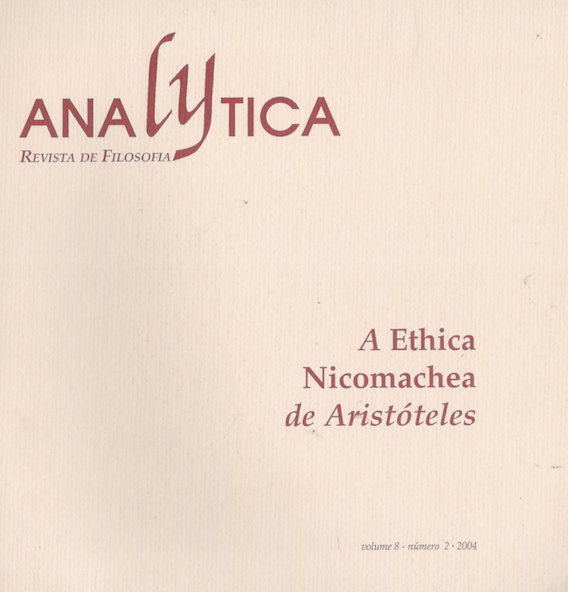Aristóteles e seus intérpretes sobre kalon e honestum
Resumo
O conceito de moralmente correto na filosofia moral inglesa moderna (no século dezessete e posteriormente) deriva, em última instância, do conceito de Aristóteles de 'bem' (kalon). Para compreender essa derivação, é necessário remeter o desenvolvimento das concepções de Aristóteles acerca do kalon às concepções estóicas acerca de kalon e honestum. Albertus Magnus e Tomás de Aquino em seus comentários e em seus discursos atribuem a Aristóteles concepções estóicas acerca de honestum. O caráter racional e imparcial dehonestum fornece uma boa razão para a identificação de honestas com correção moral.
Abstract
The concept of the morally right in modern English moral philosophy (in the 17th century and later) is derived ultimately from Aristotle's concept of the 'fine' (kalon). To understand this derivation, we need to trace the development of Aristotle's views about the kalon into Stoic views about thekalon and the honestum. In their commentaries and discussions Albertus Magnus and Thomas Aquinas attribute Stoic views on the honestum to Aristotle. The rational and impartial character of the honestum gives a good reason for identifying honestas to moral rightness.
Downloads
Downloads
Publicado
Como Citar
Edição
Seção
Licença
Os autores que publicam nesta revista concordam com os seguintes termos:
- Os autores mantêm os direitos autorais e concedem à revista o direito de primeira publicação, com o trabalho simultaneamente licenciado sob a Licença Creative Commons Atribuição-SemDerivações 4.0 Internacional (CC BY-ND 4.0), que permite a redistribuição, comercial ou não comercial, desde que a obra original não seja modificada e que seja atribuído o crédito ao autor.
- Os autores têm autorização para assumir contratos adicionais separadamente para distribuição não-exclusiva da versão do trabalho publicada nesta revista (ex.: publicar em repositório institucional ou como capítulo de livro), com reconhecimento de autoria e publicação inicial nesta revista.
- Os autores têm permissão e são estimulados a publicar e distribuir seu trabalho online (ex.: em repositórios institucionais ou na sua página pessoal) a qualquer ponto antes ou durante o processo editorial, já que isso pode gerar alterações produtivas, bem como aumentar o impacto e a citação do trabalho publicado (Veja O Efeito do Acesso Livre).


